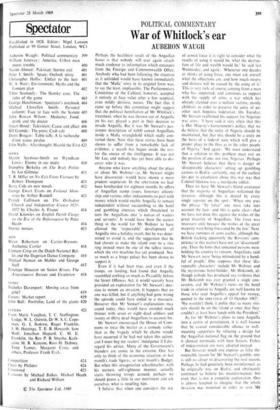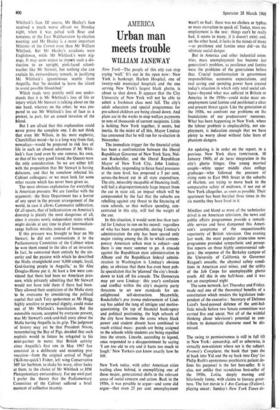War of Whitlock's ear
POLITICAL COMMENTARY AUBERON WAUGH
Perhaps the healthiest result of the Anguillan fiasco is that nobody will ever again attach much credence to information which emanates from the Foreign and Commonwealth Office. Anybody who had been following the situation as it unfolded would have known immediately that the 'Mafia' story in its original form was, to say the least, implausible. The Parliamentary Committee of the Cabinet, however, accepted it entirely at face value after a few sceptical, even mildly derisive, noises. The fact that it came up before this committee might suggest that the political humiliation of Mr Whitlock's treatment, when he was thrown out of Anguilla on his ear, played a part in their decision to invade Anguilla. But it was Mr Stewart's pas- sionate description of 6,000 cowed Anguillans inside a Mafia stranglehold which really con- verted them. Now that these stories have been shown to suffer from a remarkable lack of evidence, a search has begun inside the FC0 for the source of the intelligence. It was not Mr Lee, and nobody has yet been able to dis- cover who it was.
Anyone who knew anything about the place or about Mr Webster—as Mr Stewart might have discovered—would have shown a more prudent scepticism. In the SPECTATOR we had been bombarded for eighteen months by offers of Anguillan stamp issues, honorary citizen- ship and various other inducements to part with money which would enable Anguilla to remain independent without succumbing to the hotel and gambling interests which threatened to turn the Anguillans into 'a nation of waiters and servants.' It would have been the easiest thing in the world for Mr Webster to have allowed the 'respectable' development of Anguilla into a holiday resort, but he was deter- mined to avoid it, and the suggestion that he had chosen to make the island over to a vice ring instead must be one of the tallest stories which the uco machine has yet produced. Not so much as a bingo palace has been shown to support it.
Even if it had been true, and even if the troops, on landing, had found that Anguilla resembled nothing so much as Piccadilly before the Street Offences Act, it would scarcely have provided an explanation for Mr Stewart's deci- sion to mount an invasion. It happens that no one was killed, but if anything had gone wrong the episode could have ended in a massacre. However thin Mr Stewart's explanations may sound today. they would have sounded much thinner with seven or eight dead soldiers and twenty or thirty dead Anguillans to account for.
Mr Stewart encouraged the House of Com- mons to treat the matter as a comedy rather than as the tragedy which he claims would have occurred if he had not taken this action. and I must beg my readers' indulgence if I dis- regard his advice. Many of the Government's blunders are comic in the extreme. One has only to think of the economic situation. or last month's trade figures, or next month's Budget. But when this sexagenarian schoolteacher, with his earnest, self-righteous manner, actually starts throwing troops around, perhaps we should pause a little in our merriment and ask ourselves what is needling him.
'I believe that when one considers the use
of armed force it is right to consider what the results of using it would be, what the destruc- tion of life and wealth would be,' he said last Wednesday, and again: 'Whenever one decides or thinks of using force, one must ask oneself what the objections are, and how much misery and distress will be caused by the using of it.' This is very rich, of course, coming from a man who has supported, and continues to support with the supply of arms, a war which has already claimed over a million victims, mostly children, in order to preserve the unity of an- other such hopeless federation. On Tuesday, Mr Ste art reaffirmed his support for Nigerian war aims: '1 have said it very often that this is Her Majesty's Government's policy, that we do believe that the unity of Nigeria should be maintained, but that this should be a unity on the basis of a federal state which will give a proper place to the Ibos as to the other people of Nigeria.' And again : 'We must understand that a solution to this problem must rest on the position of one, not two, Nigerias.' Perhaps Mr Stewart believes that there is danger of 'disreputable characters' setting up gambling casinos in Biafra—certainly, one of the earliest lies put in circulation about this war was that Colonel Ojukwu was a marijuana addict.
Then we have Mr Stewart's bland assurance that the majority of Anguillans welcomed the invasion, although this is denied by every single reporter on the spot: 'When one uses the phrase "by force" one must take into account the fact--and this is quite clear—that we have not done this against the wishes of the great majority of Anguillans. The force was necessary only because the wishes of the great majority were being frustrated by the few.' Next
we have rumours of arms caches, although the British (lacking apparently the Russians' com- petence in this matter) have not yet 'discovered'
any. Then the hints that unnamed persons were holding the country to ransom. Anguillans, said Mr Stewart, were 'being intimidated by a hand- ful of people.' One supposes that these 'dis- reputable characters' include Mr Webster and the mysterious hotel-builder, Mr Holcomb, al- though nobody has produced any evidence that Mr Holcomb was ever granted a single con- cession, and Mr Webster's views on the hotel trade in relation to Anguilla are well known to those who read Anguilla's appeal for money, quoted in the SPECTATOR of 13 October 1967: 'We wouldn't think it polite that so many visi- tors should be on the island at once that they couldn't at least have lunch with the President.'
As for Mr Webster's plans to turn Anguilla into a centre of prostitution, it is well known that he caused considerable offence to well- meaning supporters by refusing a design for the Anguillan national flag on the ground that it showed mermaids with bare breasts. Fishes of indeterminate sex were adopted instead.
But however much one exposes as false the ostensible reason for Mr Stewart's gamble, one is still no closer to discovering the real reason. Perhaps he had genuinely been misinformed, as he originally was on Biafra, and obstinately continued to believe his misinformation; but even that is not a complete explanation. One is almost tempted to imagine that the whole invasion was mounted in order to save Mr
Whitlock's face. Of course, Mr Healey's face received a much worse affront on Monday night, when it was pelted with flour and tomatoes at the East Walthamstow by-election meeting; and Mr Healey is a more important Minister of the Crown even than Mr William Whitlock. But Mr Healey's assailants were Englishmen, while Mr Whitlock's were nig- nogs. It may seem unjust to impate such a dis- tinction to an upright, pink-faced school- teacher like Mr Stewart, but nothing else can explain his extraordinary remark, in justifying Mr Whitlock's ignominious scuttle from Anguilla, that 'he decided to leave the island to avoid possible bloodshed.'
Which reads very prettily until one under- stands that it is Mr Whitlock's loss of life or injury which Mr Stewart is talking about on the one hand, whereas on the other, he was pre- pared to use Mr Whitlock's loss of face as a pretext, in part, for an armed invasion of the Island.
But I am afraid that this explanation could never prove the complete one. I do not think that even Mr Wilson, in his most euphoric, Churchillian mood—he is a long way from that, nowadays—would be prepared to risk loss of life in such an absurd adventure if Mr Whit- lock's face (and even by one remove, his own, or that of his very good friend, the Queen) were the only consideration. So we are either left with the proposition that Mr Stewart is having delusions, and that he somehow infected his Cabinet colleagues; or we must look for some other reason which has never been given us.
The most obvious explanation for everything is American pressure. We are familiar with the argument : the State Department has a horror of any upset in the present arrangement of the world, in case it allows Communist infiltration. Of all upsets, that of balkanisation on America's doorstep is plainly the most dangerous of all, since it creates newly independent states which might decide at any time to plant intermediate- range ballistic missiles instead of bananas.
If this pressure was brought to bear on Mr Stewart, he did not communicate it to the Parliamentary Committee of the Cabinet when he won them round to the idea of an invasion. In fact, he converted them entirely by the sin- cerity and the passion with which he described the Mafia stranglehold over '6,000 simple, loyal, God-fearing people in Anguilla,' as Sir Alec Douglas-Home put it. At least a few were con- vinced that there had been no American pres- sure, while privately admitting that Mr Stewart would not have told them if there had been. They allowed their scepticism of the Mafia story to be overcome by considering the political capital that such Tory spokesmen as Mr Hogg, highly sensitive to personal dignity, could make out of Mr Whitlock's humiliation. But the ostensible reason, accepted by everyone present, was Mr Stewart's cock-and-bull story about the Mafia having Anguilla in its grip. The judgment of history may yet be that President Nixon, remembering the Bay of Pigs, decided that such
exploits would in future be relegated to his mini-partner in NATO; that British activity since Anguilla's first UDI in May 1967 has
consisted in a deliberate and mounting pro- vocation—from the original arrival of Nigel (`Kill-me-quick) Fisher, left wing Conservative MP for Surbiton, to shake his wavy, silver locks at them, to the choice of Mr Whitlock as HM Plenipotentiary extraordinary. For my own part I prefer the theory that the Parliamentary Committee of the Cabinet suffered a brief moment of collective insanity.



































 Previous page
Previous page